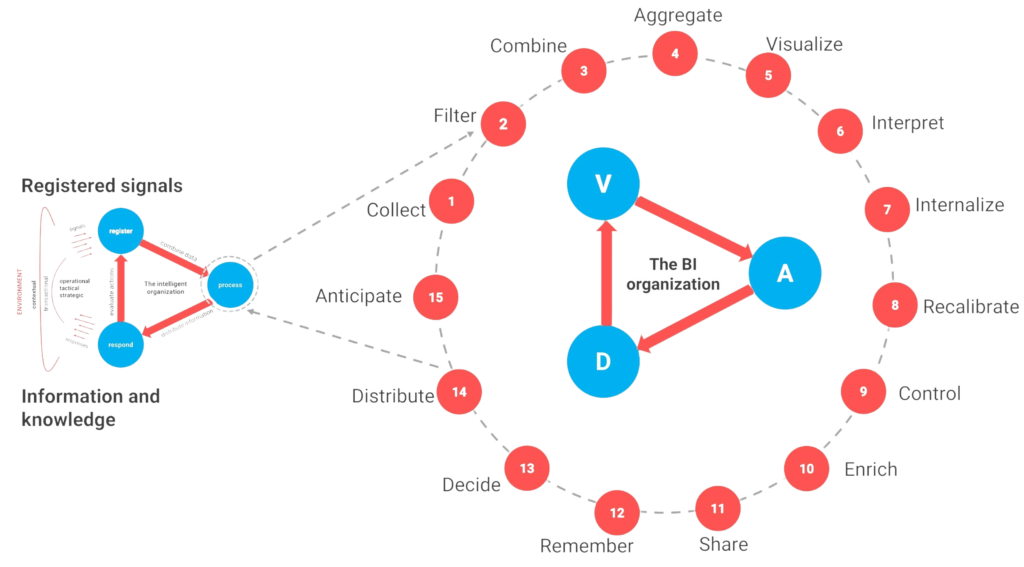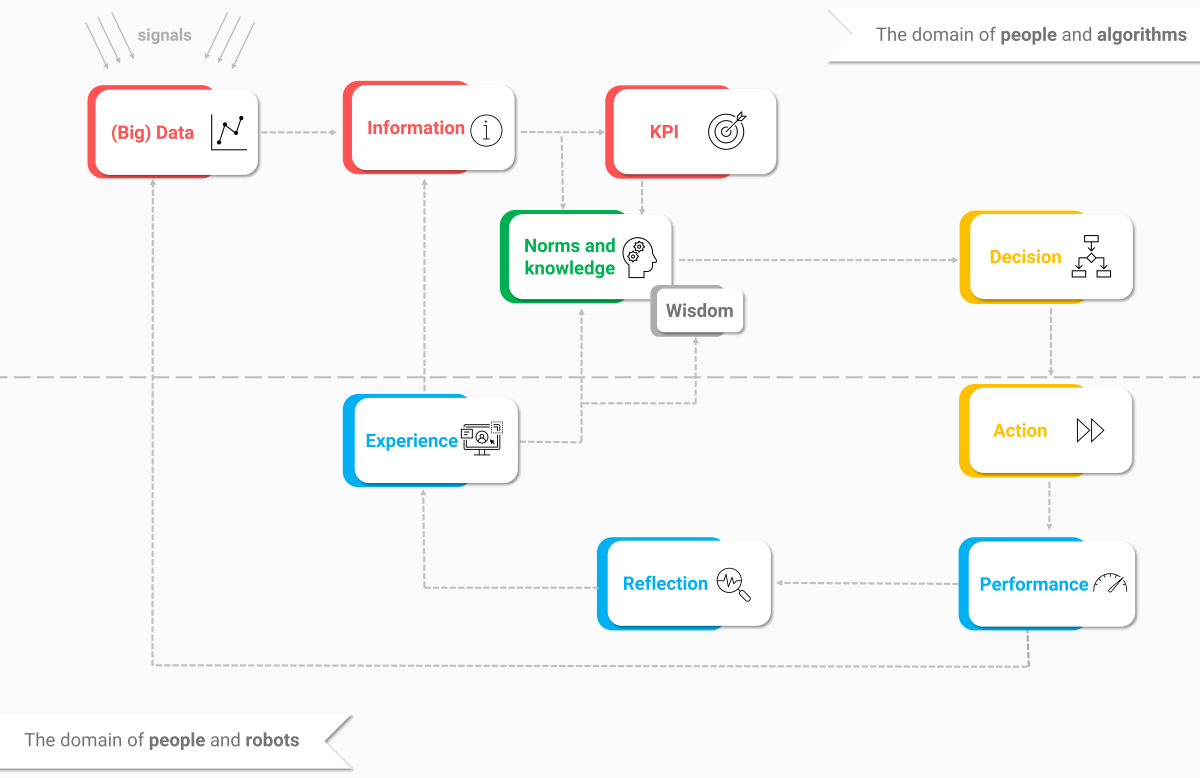Follow the 3-day interactive Business Intelligence training
In our Business Intelligence training you as a project leader, manager or employee, not only learn about the theory but also the practical Business Intelligence frameworks. Because only knowledge that you can (quickly) apply counts nowadays. You know that with the right KPIs, data analyses, and management information you could achieve better results. But you also notice that this is not easy in practice: people do not always “listen” to the dashboards and KPIs. Of course, we will also go deeper into (generative) Artificial Intelligence, Data Governance, data visualization and a solid data infrastructure because that is undeniably the key to better decisions. With this Analytics course, you will become a master in Business Intelligence and you will learn and master all the important facets of this beautiful profession. Request an in-company course here.
Business Intelligence training that clears up questions
CEO and lecturer Daan van Beek, author of the bestseller Data Science Book, will take you into the world of strategy, organizational control, data, KPIs, dashboards, data warehousing, Big Data, and data visualization, among other things, in this interactive Business Intelligence training. During this analytics training, you will get answers to the following questions:
- What is the meaning and importance of Business Intelligence & Analytics, dashboards, algorithms, and good data architecture?
- How do you perform a thorough information analysis, where and how do you find the best insights, how do you identify the most striking KPI examples and how do you get the business case for BI & Analytics completed?
- With which project approach do you take the right steps and effectively manage risks?
- How will you build a data warehouse that matches the needs of the business and the maturity level of the organization?
- How should you deal with Big Data, a diversity of data sources, algorithms, and Predictive Analytics?
- What effects can you expect from effective data visualization and what should you pay attention to when displaying information graphically?
- How will you manage those BI success factors that drive higher business results?
- How do you get all business managers and IT staff on board?
- What functions and roles does a successful Business Analytics team have, what competencies do they have and how do you build a BICC?
- Which BI tools are suitable for your situation and how do you build a future-proof BI infrastructure?
If you are faced with one or more of these questions, our in-company Business Intelligence training is the first step towards an intelligent, data-driven organization.
Contents of the Business Intelligence training
This practice-oriented Business Intelligence training provides bundled, immediately applicable knowledge to help you make BI a true success. You will also learn all the essential skills and techniques. During this interactive training, you will practice intensively – often in groups – applying the theory to your own situation. Over the course of three intensive days, participants are prepared for a leading and advisory role in the BI process.
DAY 1: Framework of concepts, basic principles, decisions, BI trends & governance
 On the first day of this interactive Business Intelligence training, we explain the purpose behind management information. We also cover the principles of the Intelligent, Data-Driven Organization and discuss the most important BI trends. Next, we dive deeper into the importance of data quality, the data warehouse, Data Governance, and the 25 benefits of Business Intelligence. Throughout the day, we will showcase many BI applications and best practices from other organizations, bringing the theory to life. The following topics will be explored in depth on this first day:
On the first day of this interactive Business Intelligence training, we explain the purpose behind management information. We also cover the principles of the Intelligent, Data-Driven Organization and discuss the most important BI trends. Next, we dive deeper into the importance of data quality, the data warehouse, Data Governance, and the 25 benefits of Business Intelligence. Throughout the day, we will showcase many BI applications and best practices from other organizations, bringing the theory to life. The following topics will be explored in depth on this first day:
At the end of the first day of this Business Intelligence training, you will understand the main principles and definitions of BI, AI, and data-driven working. After this intensive day, you’ll be ready for the second day, where you will take the next step: project management and creating a smart change plan for your own organization.
DAY 2: BI project management, strategy, the roadmap, and the BI change plan
 On the second day of this Business Intelligence training, you will dive into BI project management. The instructor will also guide you in developing a good data policy, defining a vision, formulating a solid BI strategy, setting a clear goal, and creating a BI roadmap. The focus is especially on the change management aspect and the roles of the main stakeholders: management, shop floor, process owners, and IT. How do you engage them, and how do you ensure lasting commitment and enthusiasm for Business Intelligence and AI? The following components will be covered during this day:
On the second day of this Business Intelligence training, you will dive into BI project management. The instructor will also guide you in developing a good data policy, defining a vision, formulating a solid BI strategy, setting a clear goal, and creating a BI roadmap. The focus is especially on the change management aspect and the roles of the main stakeholders: management, shop floor, process owners, and IT. How do you engage them, and how do you ensure lasting commitment and enthusiasm for Business Intelligence and AI? The following components will be covered during this day:
By the end of this day, you will already be well-versed in the subject and able to apply the key elements of change when creating a BI roadmap. This Business Intelligence course not only outlines the theoretical frameworks but also gives you the opportunity to practice and immediately provides the practical tools you need.
DAY 3: KPIs, information analysis, BI process, data visualization & BI success
 The final day of this Business Intelligence training focuses entirely on the user side of BI. The instructor will cover the complete BI process, the creation of flawless KPIs, the “1 million euro insights,” and improving the User Experience (UX), particularly through effective data visualization. All 15 steps of the Business Intelligence process listed below will be discussed:
The final day of this Business Intelligence training focuses entirely on the user side of BI. The instructor will cover the complete BI process, the creation of flawless KPIs, the “1 million euro insights,” and improving the User Experience (UX), particularly through effective data visualization. All 15 steps of the Business Intelligence process listed below will be discussed:
 Figure 1: The fifteen steps of the Business Intelligence process
Figure 1: The fifteen steps of the Business Intelligence process
You will also be introduced to the Business Intelligence framework that delivers the right insights to the right people, based on organizational roles, without unnecessary detours. At the same time, the success factors and pitfalls for Business Intelligence will be discussed one by one. During the third training day, you will learn more about the following topics:
At the end of the final day of this 3-day Business Intelligence training course, you will receive final tips from the instructor. After a short evaluation session, you will be awarded your certificate and a digital badge for LinkedIn.
Discover the success factors of Business Intelligence
Our three-day Business Intelligence course covers both the business and technical aspects of Business Intelligence. Topics include KPIs, analytics, Big Data, (generative) Artificial Intelligence, the data warehouse, data quality, the BICC, BI project management, data visualization, BI strategy, and change management. Most importantly, you will gain in-depth insight into the success factors of Business Intelligence and the 101 steps to BI success.
Bonus material: BI templates
 After completing the BI training, you will receive a set of more than eight useful Business Intelligence templates free of charge to help you organize your BI projects even more efficiently and effectively. The use of these templates will be explained in detail during the training.
After completing the BI training, you will receive a set of more than eight useful Business Intelligence templates free of charge to help you organize your BI projects even more efficiently and effectively. The use of these templates will be explained in detail during the training.
How do you implement successful BI process improvements?
In three intensive days, all business intelligence elements necessary for successful BI and process improvement are covered. People who have completed our three-day Business Intelligence training are in an excellent position to take the right steps in their business intelligence project and choose the right implementation route for their organization.

Figure 2: The Business Intelligence framework that we will go through step by step during this Business Intelligence course.
All blocks will be covered in detail during this interactive and practical analytics training. You will learn the difference between information and data. The instructor also gives you a thorough insight into KPIs, standards and the necessary Business Intelligence wisdom to work on better decision-making and performance for your organization based on facts and data.
Interactive training Business Intelligence
During each training day, group discussions take place and you work in groups on practical assignments. This creates an optimal mix between learning and doing. Upon completion of this unique Business Intelligence training, participants receive a certificate and a signed copy of the bestseller ‘Data Science Book‘.
Additional information on this BI training course
This Business Intelligence course is offered in-company. Some of the attributes are listed below:
✪ VAT exempt
✪ no study load
✪ interactive & practical
✪ certified digital certificate
✪ from 9:00 to 17:00
This course is also offered in Dutch as a part of a 10-day Master of Data Science track and CBIP certification.
Who is this BI & Analytics course intended for?
For anyone involved in a BI project, our Business Intelligence training provides valuable guidance. Our BI & Analytics training is especially popular among: (future) business intelligence project leaders, project managers, Business Intelligence managers, IT managers, business analysts, BI employees, (business) controllers, Chief Data Officers, CIOs, and business managers.
Learning objectives achieved at the end of this BI course
- You will know the key benefits and success factors of BI
- You will have mastered both the business and technical aspects of BI
- You will have an indication of your organization’s BI maturity
- You will develop in groups a complete BI vision and plans
- You will be able to make a sound business case for BI
- You will know how to develop a Business Intelligence roadmap
- You will know how to formulate flawless KPIs for your business
- You will know how effective data visualization works
- You will be able to assess which BI tools are relevant to you
- You will have gained insight into the critical success factors for BI
Register here for our Business Intelligence training
Through our registration form you can directly register for a Business Intelligence training in-company. If you have any questions about our 3-day training in BI & Analytics, please contact us directly.
About the lecturer
 Lecturer and consultant Daan van Beek MSc, author of the “Data Science Book” has more than 20 years of experience as a Business Intelligence consultant, program manager and trainer. This 3-day Business Intelligence training course was designed by him ten years ago and is constantly refined and perfected. Daan also teaches in India, New York, Kuala Lumpur, Singapore and Suriname. In the Netherlands, he teaches Business Intelligence & AI at the RC program at TIAS. He studied Administrative Information Science and Artificial Intelligence (AI) in Rotterdam and London.
Lecturer and consultant Daan van Beek MSc, author of the “Data Science Book” has more than 20 years of experience as a Business Intelligence consultant, program manager and trainer. This 3-day Business Intelligence training course was designed by him ten years ago and is constantly refined and perfected. Daan also teaches in India, New York, Kuala Lumpur, Singapore and Suriname. In the Netherlands, he teaches Business Intelligence & AI at the RC program at TIAS. He studied Administrative Information Science and Artificial Intelligence (AI) in Rotterdam and London.
Reviews about Business Intelligence Training
Giel Borsboom | Center for Human Drug Research: A fun training to really get acquainted with the world of business intelligence, data storage + visualization, and the use of AI in just three days. In addition, there are plenty of moments to reflect on what this means for your own organization, so you also get tools to start applying it in your own work.Koen Roks | WVS: Great training!
René van der Toorn | PZEM: A good and clear understanding of the content of BI and everything involved in making BI take root in an organization. Also, how to make BI grow within an organization.
Verified Participant | Mijzo: My opinion is that this training is more suited for people who already have a solid foundation of BI, as I believe that’s when you can get the most out of it. I don’t really see it as a course for gaining basic knowledge. Because of that, I can’t properly assess the content.
Harm van Engeldorp Gastelaars | Foodbyte: It is a clear and comprehensive Business Intelligence course that covers everything related to BI and data-driven working from start to finish.
Jolanda van der Wardt | CAMOT B.V.: A good, inspiring comprehensive training that provides a complete overview of BI in a short time, covering everything from technology to organizational change, with practical applications, new developments, and plenty of interaction.
Merel Visser | The Creating Blackbird: You are guided in a calm manner from the basics of BI, through visualizations, to success factors, with group exercises along the way. A good mix of people from different sectors, each bringing diverse perspectives.
Edwin Nagelvoort | Nagelvoort IT Management: Excellent, lots of variation between practice and theory. You continue to fascinate us and the course gives us food for thought. I was able to zoom in or delve more deeply into certain topics. Many thanks Daan!
Claudia Vissers | Gebroeders Blokland Development and Construction BV: Educational training with an enthusiastic trainer.
Sander Heesterbeek | Iknl: Good insight into BI. It's realistic and practical, you can immediately apply to your organization.
Herwin Broenink | ELIX: Very good format. The variety of theory and assignments was pleasant. The theory was applied to participants' companies thus learning different methods and views was nice. In terms of content, the first day was less in line with what I was looking for than the last two. I found the second day and especially the last day very valuable.
Harold ten Hove | Ten Hove Informatie Systematiek: The practical examples accompanying the theory and interaction with the participant group makes you stay actively involved, and develop an understanding of all roles within the bi process
Bruno Tuijt | Centrient Pharmaceuticals: Good for starters, clear, useful handles and tools. Review of Business Intelligence training .
Surrendra Santokhi | Local Government: Informative and well connected to new developments. Review on Business Intelligence training.
Harmen Weuring | SSC Espria: Super meaningful and many tangents to the challenges facing our organization. Review on Business Intelligence training.
Armand Vaessen | Real Estate Company: Good overview of Business Intelligence and perspective: BI is not set in stone. Room for discussion and nuance. Excellent and very enlightening on the essentials. Confident given the instructor's experience.
Nico de Jonge | ABN AMRO Lease: I was able to immediately apply my acquired knowledge in practice. I would definitely recommend Business Consultants in all industries to take the Business Intelligence course at Passionned Group. I found it extremely successful.


